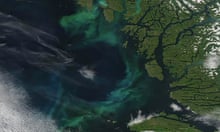The surface temperature of the world’s oceans has hit its highest ever level as climate breakdown from burning fossil fuels causes the oceans to heat.
Global average daily sea surface temperatures (SST) hit 20.96C this week, breaking the record of 20.95C reached in 2016, according to the Copernicus climate modelling service.
Scientists say it is likely the record will continue to be broken, as usually oceans are at their hottest globally in March, not August.
Dr Samantha Burgess, from Copernicus, said: “The fact that we’ve seen the record now makes me nervous about how much warmer the ocean may get between now and next March.”
It is likely the temperatures are partly driven by the El Niño weather phenomenon – 2016 was also an El Niño year. However, these weather patterns are probably exacerbated by climate breakdown and the heating atmosphere.
“The more we burn fossil fuels, the more excess heat will be taken out by the oceans, which means the longer it will take to stabilise them and get them back to where they were,” Burgess told the BBC.
This week, the British prime minister, Rishi Sunak, announced more than 100 new oil and gas licences in the North Sea, against the advice of climate experts.
Oceans also regulate the climate, soaking up heat, driving weather patterns, acting as a carbon sink and providing respite as cool air blowing off the sea can make hot land temperatures more bearable. However, these useful impacts lessen as the oceans heat, and warm waters also have less ability to absorb carbon dioxide, which means there will be more of the greenhouse gas in the atmosphere. Warming oceans also contribute to ice melting, which causes sea level rise.
Sea surface temperature measurements made from ships go back more than 150 years and are some of the longest instrumental records available for understanding the climate. For the past 40 years, there have also been measurements available from satellites and buoys.
From this data, scientists have found that over the full period of the records, global mean sea surface temperature has increased by close to 0.9C, and that the increase over the past four decades is about 0.6C. The latest five-year average is about 0.2C above the average between 1991 and 2020.
Some of the fastest warming areas are parts of the Arctic Ocean, the Baltic Sea, the Black Sea and parts of the extra-tropical Pacific.
after newsletter promotion
Several marine heatwaves have occurred around the world this year, including in the UK and Ireland earlier this summer. Last week, waters off Florida had unprecedented temperatures of 38C.
Marine heatwaves are becoming more numerous, a 2019 study found, with the number of heatwave days having tripled in the past couple of years studied. The number of heatwave days rose by more than 50% in the 30 years to 2016, compared with 1925-54. Scientists said at the time the heat destroyed swathes of sealife “like wildfires take out huge areas of forest”.
The damage caused in these hotspots is also harmful to humanity, which relies on the oceans for oxygen, food, storm protection and the removal of climate-heating carbon dioxide in the atmosphere.










